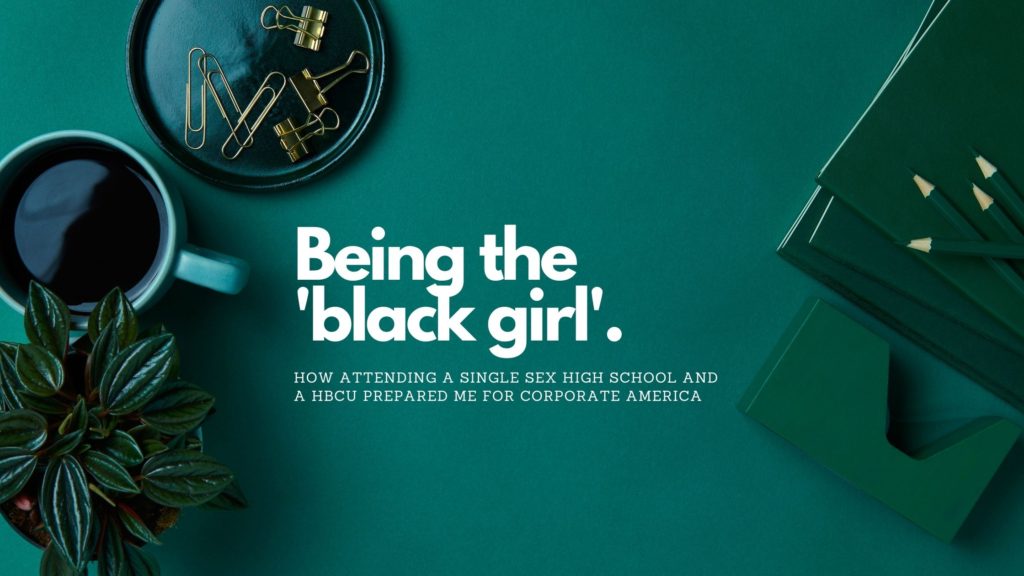Number One vs The Only One
As a byproduct of 2 thriving marginalized communities in the education systems I became acutely aware of racism and sexism upon entering the workforce. Allow me to elaborate.
I attended a single sex, all girls high school where I excelled socially and academically. My school was a part of a very small community of special acceptance public schools in the inner-city that offered a rigorous program only consisting of rapid, star, or advanced placement classes. Our regular curriculum and extra curricular activities included foreign languages, music (I took a piano class), ceramics, dance, and theater. In addition, we were required to take the PSATs every year and provided with free SAT prep courses. Essentially, the objective was for us to compete and perform academically on a collegiate level. In fact, there was an annual contest held where classes were encouraged to compete in athletic and academic challenges. My class won all 4 years, shout out to the class of 249!
Also, in high school I served in a myriad of elected leadership positions in student government, participated on a dance team, and volunteered as the girl’s varsity team’s statistician. All while carrying a full course load that include not one but two math and science courses. We were never made to feel inadequate because we were female. We were taught to carry the attitude of champions. Our teacher’s were expected to challenged us in ways to inspire critical and independent thinking as well as creativity. I attribute some of my strong will as a female in male dominated spaces to the school’s unwavering belief in our ability to perform at the highest levels regardless of our gender.
Following high school I decided to attend a historically black university. I was accepted into predominantly white institutions but I felt compelled to attend a HBCU after participating in a college tour during the spring break of my sophomore year. In college I was recognized for my leadership and academic achievements too. I had been awarded a full tuition scholarship for all four years and I was the recipient of the Governor’s scholarship my junior year. Additionally, I served as the Business Club President, Treasurer of my class, Student Leader Ambassador, and Algebra Tutor and Counselor for the Upward Bound program. Simply, I excelled as a student, though my social life was a bit of a reck. The introduction of men back into my space was a distraction. I definitely see the benefits of single sex schooling but that is a different conversation.
It is my contention both schools shielded me from the injustices I would later experience in the real world. Both schools offered a competitive environment for me to blossom free of adversity.
It was not until I entered the workforce that my intellectual and leadership capabilities were questioned. I was confused considering my background and eduction history. The only variable between school and work was the change in the leadership construct. The leadership team in my first corporate job was almost exclusively made up of white males. Again, this power dynamic made me acutely aware of sexism and racism even if it was covert and unintentional. As a black woman I believe I was often perceived as inferior in work environments. Again, this revelation was bewildering. I will admit both my high school and college made attempts to prepare me for this type of discrimination but they both fell short. In high school we were taught to compete intellectually but unfortunately race was overlooked. Whereas, in college we were taught about the African American experience but not the gender experience. So when I was thrusted into the working world where my gender and race mattered and not in a good way, I did not fair well. To be fair there was definitely an effort to be more inclusive of women in leadership but those women rarely were women of color. It was blatantly obvious that corporate leadership lacked racial diversity. Suddenly, I was not competing to be number one anymore. I was competing to at least be the only one in the room who looked like me.
It was an unspoken and unwritten understanding that depending on the prestige of a position there could only be one or maybe two diversity hires. Furthermore, if a black woman did somehow manage to successfully score a leadership role, it seemed her qualifications were scrutinized to a higher degree. An example of this scrutiny would be what I experienced while working for a prior employer. At this job a black female was announced as the first black and first female district manager in that county’s history. It was a monumental accomplishment minimized by a few insecure men on the job. Before meeting her, I had heard many unpleasant rumors about her competencies and sexual favors performed for the role; it was deplorable. Apparently we women can only screw our way to the top. Finally before leaving the company I had the opportunity to meet this historic woman for myself. She was very much competent and capable of her job. Plus she advocated for other black women.
Another issue I experienced in corporate was the the gender and race pay gap! My former male counterparts frequently and obnoxiously discussed their salaries on the floor. So it did not take much effort on my end to learn I was being compensated much less for performing the same job. It is a very toxic culture but thankfully it is changing. In closing, I am grateful for my high school and college experiences. These institutions protected me from during my most formidable and impressionable years. They allowed me to thrive in environments conducive to growth and absent of discrimination. I had been beaten but not broken in corporate America as a result of my education.
